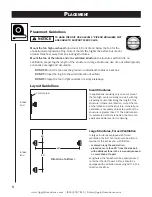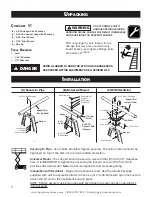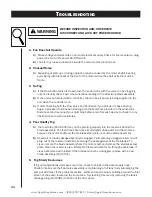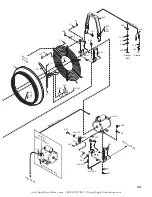
5
Mount the fan high overhead.
Allow room in front of and below the fan for the
unobstructed propulsion of fog. Rule of thumb: the higher the better, but mount
at least three feet away from any roofing structures.
Mount the fan at the intake end of a ventilated structure.
In structures with mild to no
ventilation, propel fog the length of the structure. In large structures, use of an oscillator greatly
enhances coverage and circulation.
DO NOT:
Mount the fan near the ground or underneath tables or benches.
DO NOT:
Propel the fog into the wind (direction of airflow).
DO NOT:
Cramp the fan in tight quarters or skinny aisleways.
>
>
>
>
>
20'
40'
60'
Intake
End
Intake
End
Control are
a
In applications requiring only one unit, mount
the fan high, centered along one wall, with fog
propelling horizontally along the length of the
structure. If there is ventilation, mount the fan
at the intake end of the structure. Generally, no
oscillation is necessary unless the width of the
structure is greater than 20'. The best location
for automated controls is behind the fan, at an
easily accessible level for monitoring.
In large structures equipped with forced
ventilation, the first fan row should be within a
few feet of the intake end, with first fan:
- centered along the end wall (or)
- placed no more than 20' from the side wall,
with additional fans in the row equally spaced
no more than 40' apart.
Lengthwise, the fans should be equally spaced
no farther than 60' apart. All fans should be
equipped with oscillation, sweeping 180˚ in the
direction of airflow.
Layout Guidelines
Large Structures, Forced Ventilation
Small Structures
P
LACEMENT
TO HANG THE UNIT, USE A LEVEL 1" PIPE OR DRILLABLE FLAT
AREA ABLE TO SUPPORT OVER 30 LBS.
NOTICE
Placement Guidelines
>
Direction of airflow >
www.JigglyGreenhouse.com | (800) 878-7829 | [email protected]




































